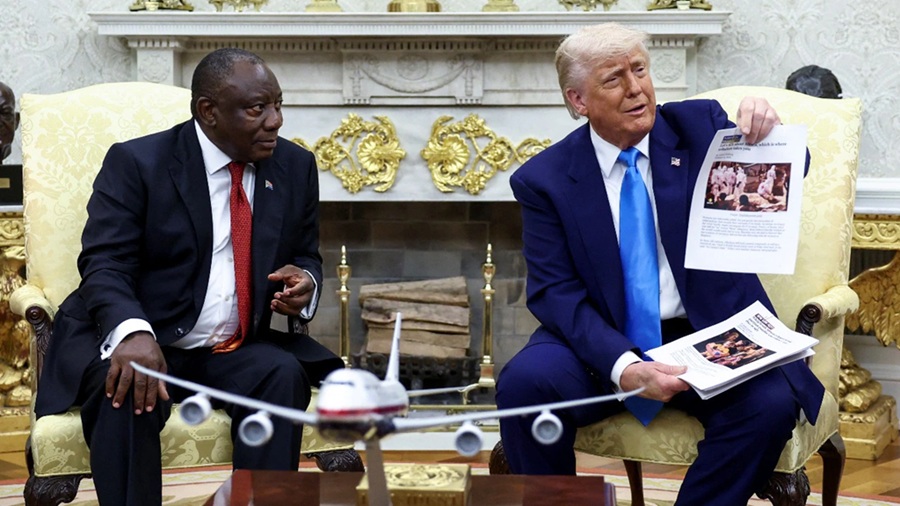In a dramatic and politically charged moment that has sparked fresh international controversy, U.S. President Donald Trump recently confronted South African President Cyril Ramaphosa with a video that allegedly shows what Trump and his supporters describe as evidence of "white genocide" in South Africa. The term, widely disputed and criticized by human rights organizations, refers to the supposed targeted killing and persecution of white farmers in post-apartheid South Africa.
The confrontation occurred during a closed-door diplomatic gathering on the sidelines of a global economic forum. According to sources close to the event, Trump presented a compilation video featuring graphic footage of farm attacks and alleged racial violence targeting white South Africans. Eyewitnesses report that Trump, in his usual direct style, challenged Ramaphosa on the South African government’s response to violence in rural areas and what he described as the “systematic targeting” of white landowners.
Background on the ‘White Genocide’ Controversy
The claim of a “white genocide” in South Africa has circulated in far-right circles for over a decade. Proponents argue that white farmers are being deliberately targeted in a racially motivated campaign, citing statistics about farm attacks and murders. The South African government, as well as international researchers, have consistently rejected this narrative, stating that while rural crime is a serious issue, there is no evidence of an orchestrated campaign of ethnic cleansing against white citizens.
Farm attacks in South Africa are part of a broader landscape of violent crime that affects all communities. South Africa has one of the highest crime rates in the world, and rural areas are particularly vulnerable due to poor policing infrastructure. However, critics argue that the term “white genocide” oversimplifies the issue and serves to inflame racial tensions.
Trump’s History with the Issue
This is not the first time Donald Trump has weighed in on the situation in South Africa. In 2018, during his presidency, Trump tweeted that he had asked then-Secretary of State Mike Pompeo to study “land and farm seizures and expropriations and the large scale killing of farmers.” The tweet, which cited content from Fox News, led to a diplomatic incident, with the South African government issuing a formal protest and accusing Trump of spreading “misinformation.”
Trump has since continued to align himself with narratives that resonate with his political base, which includes segments of the alt-right and white nationalist movements. His recent confrontation with President Ramaphosa is viewed by many as part of this broader strategy to project himself as a global advocate for what he terms “forgotten” white populations.
Ramaphosa’s Response
President Cyril Ramaphosa, a veteran of the anti-apartheid struggle and a skilled negotiator, responded to Trump’s allegations with measured firmness. According to aides, Ramaphosa dismissed the video as “propaganda” and reiterated the South African government’s commitment to addressing all forms of violence, regardless of the victim’s race.
He also emphasized the complexity of land reform in South Africa, noting that the country is still grappling with the legacy of apartheid-era land dispossession. The South African government has proposed a policy of land expropriation without compensation to redress historical injustices, but the plan has drawn criticism and fear from both domestic opposition groups and foreign investors.
Ramaphosa reportedly told Trump that South Africa’s land reform efforts are being conducted through constitutional and democratic means, with a strong focus on preventing violence and ensuring food security.
International and Domestic Reactions
The renewed attention to the “white genocide” claim has prompted a range of responses. Human rights organizations such as Amnesty International and Human Rights Watch have reiterated that there is no basis for the claim of genocide, and have warned against the dangers of disinformation in fueling racial hatred and division.
In the U.S., Trump’s supporters have hailed his stance as brave and necessary, accusing mainstream media of ignoring the plight of white South Africans. On the other hand, critics argue that Trump’s approach oversimplifies complex socio-economic issues and promotes a one-sided, racially charged narrative.
South African civil society groups have also weighed in, with many expressing concern that Trump’s intervention could exacerbate existing tensions. “Violent crime is a tragedy for all South Africans,” said a spokesperson for the Institute for Security Studies. “Turning it into a racial spectacle undermines efforts to build a more just and inclusive society.”
A Polarizing Narrative
The use of the term “genocide” in this context is especially problematic given the international legal definition, which involves a deliberate and systematic attempt to destroy a particular group. Most analysts agree that South Africa’s current problems—deep inequality, high crime rates, and land ownership disparities—stem from structural issues that affect both black and white citizens.
Still, the enduring appeal of the “white genocide” narrative in certain political circles highlights how race and fear continue to be potent tools in global discourse. As South Africa continues its journey toward healing from apartheid, and as political figures like Trump leverage global grievances for domestic political gain, the line between advocacy and exploitation becomes increasingly blurred.
Conclusion
Donald Trump’s confrontation with Cyril Ramaphosa over alleged “white genocide” has reignited a polarizing debate that touches on race, crime, history, and international politics. While the incident may serve short-term political goals, the broader conversation requires nuance, empathy, and a commitment to factual integrity. For South Africa, the challenge remains to address its social and economic problems in a way that transcends racial binaries—and for the world, the challenge is to resist the pull of simplistic, sensationalist narratives.
